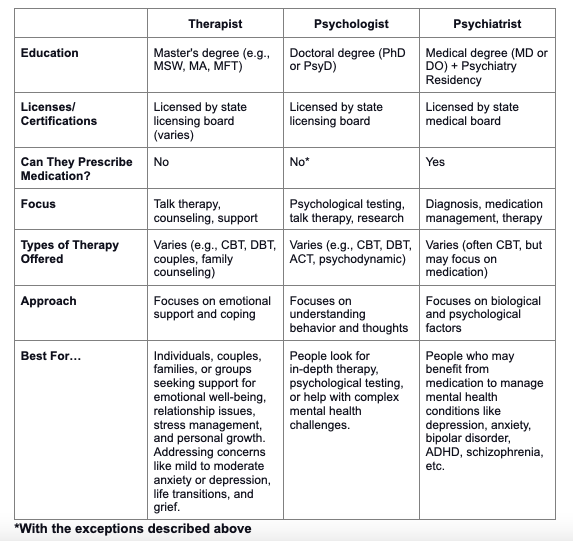Are you trying to better your mental health and well-being but unsure who to see?
You might wonder, can a therapist prescribe medication? Or what’s the difference between a therapist, psychologist, and psychiatrist?
It can be confusing!
It’s important to know who to see for what so you get the best possible care.
So, today, we’re here to make it simple.
Understanding the Different Mental Health Professionals
Therapists
The term “therapist” is an umbrella term for a broad range of professionals trained in counseling and talk therapy. They can have different titles, like counselors, clinicians, life coaches, or social workers.
Therapists work with individuals, couples, families, and groups based on their patients’ needs.
Therapists assist you in finding and challenging negative thoughts. They can also help you improve your communication skills and build your self-esteem, among other things.
Therapists cannot prescribe medication.
Psychologists
Psychologists are also experts in talk therapy. To practice independently, they must have a doctoral degree (PhD or PsyD) in psychology.
They are trained in assessing, diagnosing, and treating mental health conditions through various therapeutic approaches. They are experts in cognitive abilities, personality traits, emotional functioning, and behavioral patterns.
Depending on their expertise and practice, they work with individuals, couples, families, and groups.
While many psychologists provide therapy, some specialize in psychological testing and research.
Psychologists cannot prescribe medication (except in certain states that permit “prescribing psychologists” who have received additional training in clinical psychopharmacology and have been supervised by psychiatrists).
Psychiatrists
Psychiatrists are medical doctors (MDs) who specialize in mental health.
They can do everything a therapist and psychologist can do, plus prescribe medication. They understand the connection between your mental and physical health.
After medical school, they complete a residency in psychiatry. During their residency, psychiatrists learn how to diagnose and treat mental, emotional, and behavioral disorders. They may also help prevent these issues.
Their medical expertise and mental health knowledge uniquely qualify them to provide holistic care focused on your mental and physical well-being.
Who Can Prescribe Medication?
Only psychiatrists, as medical doctors, can prescribe medication for mental health conditions. To prescribe medication, you need a medical license and a deep understanding of how medications affect the body and brain.
At A Better Day Psychiatry, we’ll perform an extensive assessment to get a complete picture of your needs. Then, based on our findings, we can decide if medication is right for you. We will also manage your medication, including dosage and any side effects.
Why See a Psychiatrist for Medication Management?
You might wonder, “Can’t I get meds from my regular doctor?”
Some general practitioners (GPs) and registered nurses (RNs) can prescribe certain medications. However, psychiatrists have specialized training in this area.
They have years of extra study focused entirely on mental health and medication. This means they can:
- Accurately diagnose your specific mental health condition.
- Choose the most effective medication for your needs.
- Carefully manage your medication, including dosage and side effects.
- Consider how mental health medicine interacts with other medications you take.
- Offer a more holistic approach, considering your mental and physical health.
Who Should I See?

Your Path to Wellness
Good mental health is key to a happy life.
Even though we are psychiatrists, we know that medicine is not the only way to achieve good mental health. So, we’ll work with you to find the lowest dosage you need to live a fulfilled and quality life.
In addition, we provide evidence-based therapeutic services to ensure you receive comprehensive treatment.
Don’t wait to feel better.
Schedule an appointment today.
Disclaimer: This blog post provides general information about mental health and related topics. It is not a substitute for professional medical advice, diagnosis, or treatment. Always seek the advice of a qualified mental health professional for any questions you may have regarding your own mental health or a specific medical condition.

